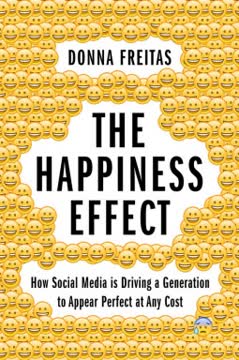Key Takeaways
1. Social Media Creates a "Happiness Effect," Prioritizing Appearance Over Authenticity
By doing such a good job of “appearing happy,” we risk losing the very things that make us happy.
The pressure to project happiness. Social media fosters a culture where individuals feel compelled to present an idealized, perpetually positive version of themselves. This "happiness effect" leads to a focus on outward appearances rather than genuine emotions and experiences. College students, in particular, feel immense pressure to showcase a perfect life, often eclipsing their actual well-being.
Consequences of the happiness effect. The constant performance of happiness can be emotionally draining, leading to feelings of inauthenticity and alienation. Individuals may neglect their true selves, suppressing vulnerabilities and genuine emotions in favor of a curated online persona. This can result in a disconnect from real-life relationships and a diminished sense of self-worth.
The cost of the performance. The pursuit of appearing happy online can overshadow the pursuit of actual happiness. By prioritizing external validation through "likes" and shares, individuals may sacrifice genuine joy, connection, and meaningful experiences. This creates a cycle where the appearance of happiness becomes more important than the real thing.
2. Constant Comparison on Social Media Erodes Self-Esteem and Fuels FOMO
People share the best version of themselves, and we compare that to the worst version of ourselves.
The comparison trap. Social media platforms are designed to showcase curated highlights of people's lives, leading to constant social comparison. Individuals often compare their own struggles and insecurities to the seemingly perfect lives of others, resulting in feelings of inadequacy and low self-esteem. This is exacerbated by the fact that people are seeing only the "best versions" of their friends and acquaintances.
Fear of Missing Out (FOMO). The constant exposure to others' exciting experiences on social media fuels a sense of FOMO, or the fear of missing out. Individuals may feel compelled to participate in activities solely to document them online and avoid appearing less successful or happy than their peers. This can lead to a cycle of anxiety and dissatisfaction.
The illusion of perfection. It's crucial to recognize that social media profiles are often carefully constructed facades, not accurate representations of reality. People tend to share only positive aspects of their lives, omitting challenges and struggles. Maintaining a rational perspective while viewing social media feeds is essential for protecting self-esteem.
3. The Professionalization of Social Media Demands a Carefully Curated Online Persona
People cannot get jobs, or not get interviews because of what they put on social media.
The watchful eye of employers. College students are acutely aware that potential employers are scrutinizing their social media accounts. This awareness leads to a careful curation of online profiles, with students avoiding controversial topics, negative emotions, and anything that might jeopardize their future career prospects.
The "Facebook Cleanup." Many students engage in a "Facebook Cleanup," deleting posts and photos that might be deemed inappropriate or unprofessional. This involves removing anything that could be perceived as negative, controversial, or revealing of personal struggles. The goal is to present a spotless online image that aligns with employer expectations.
The pressure to conform. The professionalization of social media can stifle authenticity and self-expression. Students may feel compelled to suppress their true opinions and interests in favor of a bland, inoffensive online persona. This can lead to a sense of alienation and a disconnect between their real selves and their virtual representations.
4. Anonymity Unleashes Both Honesty and Cruelty in Online Interactions
I feel like unfortunately [what’s on Yik Yak] is a pretty accurate representation of what happens at [my school].
The allure of anonymity. Platforms like Yik Yak and Snapchat offer users the ability to express themselves without revealing their identities. This anonymity can be liberating, allowing individuals to share honest thoughts and feelings without fear of judgment or repercussions. It can also serve as a cathartic outlet for venting frustrations and anxieties.
The dark side of anonymity. Anonymity can also unleash a torrent of negativity, cruelty, and hate speech. Without the constraints of accountability, individuals may engage in cyberbullying, slut-shaming, and racist or homophobic attacks. Anonymous platforms can become breeding grounds for toxicity and division.
The need for critical engagement. It's crucial to approach anonymous platforms with a critical eye, recognizing both their potential for positive expression and their capacity for harm. Users should be aware of the risks of engaging in or being targeted by negative behavior and take steps to protect themselves and others.
5. Gender Stereotypes and Unequal Standards Persist and are Amplified Online
A girl just posts a random picture in her room laying down on a bed, and it gets a hundred ‘likes’!
Unequal standards. Social media often reinforces traditional gender stereotypes and imposes unequal standards on men and women. Women may face pressure to conform to narrow beauty ideals, while men may be judged on their achievements and financial success. These stereotypes can be amplified online, leading to feelings of inadequacy and pressure to conform.
The "selfie" phenomenon. The prevalence of selfies, particularly among women, is often viewed through a gendered lens. While some see selfies as empowering acts of self-expression, others criticize them as narcissistic and attention-seeking. This highlights the double standards that women face online, where they are both encouraged to present themselves attractively and shamed for doing so.
The pressure to be perfect. Women often feel immense pressure to maintain a flawless online image, carefully curating their profiles to showcase their best selves. This can lead to a constant cycle of self-criticism and a fear of revealing any imperfections. Men, while not immune to these pressures, may experience them differently, with a greater emphasis on projecting strength and success.
6. Smartphones: Essential Tools That Simultaneously Enslave and Empower
If I don’t have my phone, I feel empty.
The double-edged sword. Smartphones have become indispensable tools for communication, information access, and navigation. However, they can also be addictive and distracting, leading to a constant state of hyper-connectivity and a diminished ability to focus on the present moment.
The fear of missing out. The constant stream of notifications and updates on smartphones fuels a fear of missing out, compelling individuals to check their devices compulsively. This can lead to anxiety, stress, and a diminished ability to disconnect and relax.
The need for balance. It's crucial to find a healthy balance between the benefits of smartphone use and the need for disconnection and mindfulness. Setting boundaries, limiting screen time, and prioritizing real-life interactions are essential for maintaining well-being.
7. Taking Breaks from Social Media Offers Clarity and a Return to Real Life
I think that not doing as much social media has helped me, for sure.
The benefits of disconnection. Taking breaks from social media can provide a sense of liberation and clarity. It allows individuals to disconnect from the constant stream of information and comparisons, fostering a greater sense of self-awareness and presence in the moment.
Reclaiming time and attention. Unplugging from social media frees up time and attention for other activities, such as reading, spending time with loved ones, pursuing hobbies, and engaging in self-reflection. This can lead to a more fulfilling and meaningful life.
Strategies for unplugging. There are various ways to take breaks from social media, ranging from temporary deactivations to setting daily limits on app usage. The key is to find a strategy that works for you and allows you to reclaim control over your time and attention.
8. Navigating Romance and Relationships in the Age of Social Media is Fraught with Peril
You can do a lot of damage on Facebook.
The performance of relationships. Social media can create pressure to perform relationships for an audience, leading to inauthenticity and a focus on external validation. Couples may feel compelled to showcase their happiness online, even if they are struggling in private.
The complexities of "Facebook official." Making a relationship "Facebook official" can be a significant milestone, but it also comes with its own set of challenges. It can create pressure to maintain a certain image, and it can make breakups even more public and painful.
The temptation of online flirting. Social media can also create opportunities for infidelity and emotional affairs. The ease of connecting with others online can blur boundaries and lead to temptations that might not otherwise exist.
9. Faith and Spirituality Offer a Framework for Navigating the Virtual World
I think God can use anything for His glory.
A moral compass. For some individuals, faith and spirituality provide a framework for navigating the complexities of social media. Religious values can guide their online behavior, helping them to make ethical choices and avoid harmful content.
Social media as a tool for evangelization. Some religious individuals see social media as a tool for spreading their faith and connecting with like-minded people. They may use their platforms to share inspirational messages, promote religious events, and engage in discussions about spirituality.
The risk of false idols. Others worry that social media can become a distraction from their faith, leading them to prioritize online validation over their relationship with God. They may choose to limit their social media use or abstain from it altogether to protect their spiritual well-being.
Last updated:
FAQ
1. What is The Happiness Effect by Donna Freitas about?
- Explores social media’s impact: The book investigates how social media shapes the lives, identities, and happiness of young adults, especially college students, focusing on the pressure to appear perfect and happy online.
- Based on real student voices: Freitas draws on interviews and surveys with nearly 1,000 college students, providing an in-depth, empirical look at their experiences.
- Examines broader implications: The book discusses not only individual effects but also cultural, ethical, and institutional issues, such as authenticity, privacy, bullying, and the professionalization of online identities.
2. Why should I read The Happiness Effect by Donna Freitas?
- Insight into youth culture: The book offers a rare, nuanced understanding of how social media affects young adults’ emotional lives, relationships, and self-perception.
- Challenges stereotypes: Freitas dispels common assumptions about narcissism and superficiality, revealing the real struggles with vulnerability and authenticity in the digital age.
- Practical guidance: The book provides advice and virtues for navigating social media healthily, making it valuable for parents, educators, and anyone interested in the digital generation.
3. What are the key takeaways from The Happiness Effect by Donna Freitas?
- The “happiness effect” is pervasive: Young adults feel compelled to present only positive, happy versions of themselves online, often at the expense of authenticity and mental health.
- Social media shapes identity: Students carefully craft their online personas, treating them as brands, which can lead to emotional exhaustion and alienation.
- Need for new virtues: Freitas proposes eight virtues—such as vulnerability, authenticity, and unplugging—to help young adults balance social media’s demands with emotional well-being.
4. What is the “happiness effect” as defined in The Happiness Effect by Donna Freitas?
- Definition: The “happiness effect” is the social media-driven pressure to always appear happy, successful, and perfect online, regardless of one’s true feelings.
- Consequences: This leads to curated highlight reels that mask real struggles, undermining genuine self-expression and contributing to anxiety, isolation, and low self-esteem.
- Cultural reinforcement: The effect is perpetuated by societal expectations, peer pressure, and institutional demands, creating a cycle of performance and emotional exhaustion.
5. How does The Happiness Effect by Donna Freitas explain the impact of social media on self-presentation and identity?
- Branding the self: Students see their online profiles as brands, engaging in crafting, cultivating, and curating their public personas to please various audiences, including future employers.
- Split identities: Many experience a divide between their “real me” and “online me,” often feeling inauthentic and exhausted by the need to perform.
- Gendered dynamics: Women face greater scrutiny and pressure to appear attractive and happy, while men are judged differently, reinforcing traditional gender stereotypes.
6. What role do “likes” and social media feedback play in The Happiness Effect by Donna Freitas?
- Quantifying popularity: “Likes” are seen as a measure of social approval and popularity, deeply affecting students’ self-esteem and sense of self-worth.
- Strategic posting: Students often post content to maximize likes, sometimes deleting posts that receive little attention, creating a stressful feedback loop.
- Gender differences: Women tend to receive more likes, especially on selfies, reinforcing gendered expectations and pressures around appearance and popularity.
7. How does The Happiness Effect by Donna Freitas address bullying and cyberbullying on social media?
- Prevalence and fear: Bullying, especially on anonymous platforms like Yik Yak, is a major concern, with students fearing public shaming and exclusion.
- Emotional impact: Victims of cyberbullying experience deep emotional pain and social isolation, with social media amplifying the reach and persistence of bullying.
- Need for empathy: Freitas calls for greater awareness, empathy, and constructive responses to online meanness, highlighting the importance of support systems and education.
8. What does The Happiness Effect by Donna Freitas say about authenticity and anonymity on social media?
- Authenticity is challenged: Young adults struggle to be authentic online due to pressures to conform to idealized images and the happiness effect.
- Anonymity’s double-edged sword: Anonymous platforms can foster honest expression and emotional release but also enable cruelty, bullying, and hate speech.
- Navigating tension: Students seek spaces for genuine self-expression while being aware of the risks of unregulated, anonymous communication.
9. How does The Happiness Effect by Donna Freitas describe the professionalization of social media among college students?
- Social media as résumé: Students treat platforms like Facebook as professional spaces, maintaining spotless images to impress future employers and engaging in “Facebook Cleanups.”
- Constant surveillance: They feel monitored by peers, professors, and potential employers, leading to self-censorship and relentless image management.
- Impact on authenticity: The need for a professional persona often conflicts with authentic self-expression, raising questions about the true purpose of social media.
10. What insights does The Happiness Effect by Donna Freitas provide about selfies, gender, and self-presentation?
- Selfies as identity performance: Selfies are a popular form of self-expression, especially among young women, serving both as empowerment and a source of anxiety.
- Gendered patterns: Women post more selfies and face greater scrutiny, while men are judged differently, reinforcing traditional gender roles and expectations.
- Ambivalence about selfies: Students express mixed feelings, seeing selfies as both fun and stressful, and the book encourages a nuanced understanding beyond stereotypes.
11. How does The Happiness Effect by Donna Freitas explore the intersection of social media and religion or spirituality?
- Faith as a filter: Some students use religious beliefs to guide their social media behavior, using platforms for evangelization or self-expression.
- Privacy and tension: Students from conservative backgrounds navigate complex rules and may hide aspects of their faith to avoid conflict or judgment.
- Limited religious expression: Most students avoid posting about religion or politics due to fear of controversy, limiting authentic dialogue and expression online.
12. What practical advice and virtues does The Happiness Effect by Donna Freitas offer for healthy social media use?
- Eight proposed virtues: Freitas suggests vulnerability, authenticity, tolerance of difference, forgetting, living in the moment, play, unplugging, and quitting as key virtues for the social media age.
- Importance of unplugging: Regular breaks from social media and smartphones are encouraged to foster presence, reflection, and mental well-being.
- Role of support systems: Families, educators, and institutions are urged to help young adults develop critical thinking, set healthy boundaries, and foster open conversations about social media use.
Review Summary
The Happiness Effect explores social media's impact on college students, based on extensive interviews. Reviewers found it insightful but repetitive, praising its relevance while critiquing its writing quality and narrow focus. Many appreciated the firsthand accounts but wanted more analysis. The book highlights pressures to appear perfect online, affecting mental health and self-esteem. Some found it eye-opening, others outdated. Overall, it's seen as a good introduction to social media's effects, particularly for those unfamiliar with the topic.
Similar Books
Download PDF
Download EPUB
.epub digital book format is ideal for reading ebooks on phones, tablets, and e-readers.











